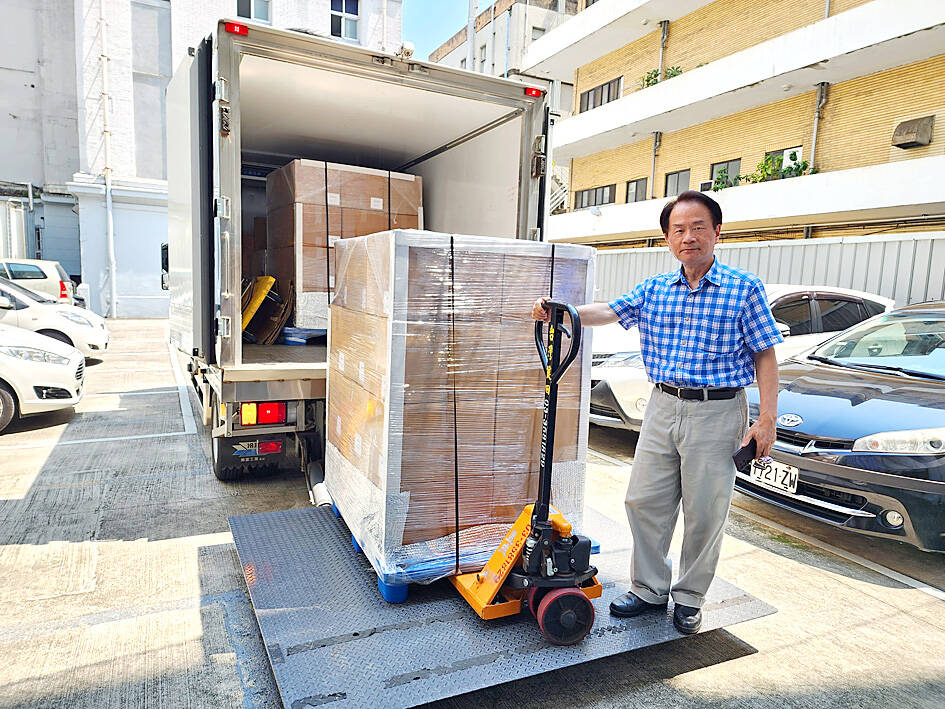The diaries of former Republic of China (ROC) presidents Chiang Kai-shek (蔣介石) and Chiang Ching-kuo (蔣經國) arrived in Taiwan on Thursday, and are to be published by Academia Historica from October, the state archives said.
The documents, previously housed at Stanford University’s Hoover Institution Library & Archives, were sent by the California research institute on a flight that landed at Taiwan Taoyuan International Airport early on Thursday morning, the state archives said in a press statement later that day.
The 59 boxes of documents delivered to the state archives include the two former presidents’ diaries dated from 1917 to 1979, as well as private letters, manuscripts, telegrams, microforms, official documents and other historic materials, the archives said.

Photo courtesy of Academia Historica
These historic materials first arrived at the Hoover Institution after it signed an agreement in 2005 with Chiang Ching-kuo’s daughter-in-law Chiang Fang Chih-yi (蔣方智怡), which stipulated that the institute could curate the diaries for 50 years.
This led to years of legal wrangling over rightful ownership of the documents.
Chiang Fang and other family members began transferring ownership of the diaries to Academia Historica in 2013, making the state archives the official custodian, the archives said.
Last year, the High Court ruled that documents produced by the two former presidents while they were in office were the property of the country, while personal materials kept when they were not president belonged to the Chiang family, the archives said.
The Taiwanese court ruling was accepted in July by a court in California — which also first began hearing an ownership case brought by Stanford in 2013 — and ordered the university to return the documents to Academia Historica within 60 days, the archives said.
Academia Historica said that it plans to publish the first volume of Chiang Kai-shek’s diary — kept from 1948 to 1954 — in late October, and Chiang Ching-kuo’s diary — kept from 1970 to 1979 — toward the end of this year.
The historic documents would also be digitized for researchers.
The state archives already runs an online presidential database that covers every ROC president from Chiang Kai-shek, who took office in 1948, to Tsai Ing-wen (蔡英文), who is to leave office after she completes her two four-year terms in May next year.
In a press release issued on Friday, the Hoover Institution announced that the handwritten diaries, including portions of the collection that were previously unavailable to the public, would remain accessible for academic purposes.
The Chiang diaries are one of the most requested items by researchers and contain decades of valuable political and foreign policy insights of Taiwan’s past leaders, the institute said.
Academics using the diaries have revised and expanded the understanding of modern China, the Cold War and global history, it said.

ACTION PLAN: Taiwan would expand procurement from the US and encourage more companies to invest in the US to deepen bilateral cooperation, Lai said The government would not impose reciprocal tariffs in retaliation against US levies, President William Lai (賴清德) said yesterday, as he announced five strategies to address the issue, including pledging to increase Taiwanese companies’ investments in the US. Lai has in the past few days met with administrative and national security officials, as well as representatives from various industries, to explore countermeasures after US President Donald Trump on Wednesday last week announced a 32 percent duty on Taiwanese imports. In a video released yesterday evening, Lai said that Taiwan would not retaliate against the US with higher tariffs and Taiwanese companies’ commitments to

‘SPECIAL CHANNEL’: Taipei’s most important tasks are to stabilize industries affected by Trump’s trade tariffs and keep negotiations with Washington open, a source said National Security Council Secretary-General Joseph Wu (吳釗燮) arrived in the US for talks with US President Donald Trump’s administration, a source familiar with the matter said on Friday. Wu was leading a delegation for a meeting known as the “special channel,” the Financial Times reported earlier. It marked Trump’s first use of the channel since returning to the White House on Jan. 20. Citing a source familiar with the matter, the Financial Times reported that Minister of Foreign Affairs Lin Chia-lung (林佳龍) was also a part of the delegation. The visit came days after China concluded war games around Taiwan and amid Trump’s

Intelligence agents have recorded 510,000 instances of “controversial information” being spread online by the Chinese Communist Party (CCP) so far this year, the National Security Bureau (NSB) said in a report yesterday, as it warned of artificial intelligence (AI) being employed to generate destabilizing misinformation. The bureau submitted a written report to the Legislative Yuan in preparation for National Security Bureau Director-General Tsai Ming-yen’s (蔡明彥) appearance before the Foreign Affairs and National Defense Committee today. The CCP has been using cognitive warfare to divide Taiwanese society by commenting on controversial issues such as Taiwan Semiconductor Manufacturing Co’s (TSMC, 台積電) investments in the

HELPING HAND: The steering committee of the National Stabilization Fund is expected to hold a meeting to discuss how and when to utilize the fund to help buffer the sell-off The TAIEX plunged 2,065.87 points, or 9.7 percent, to close at 19,232.35 yesterday, the highest single-day percentage loss on record, as investors braced for US President Donald Trump’s tariffs after an extended holiday weekend. Amid the pessimistic atmosphere, 945 listed companies led by large-cap stocks — including Taiwan Semiconductor Manufacturing Co (TSMC, 台積電), Hon Hai Precision Industry Co (鴻海精密) and Largan Precision Co (大立光) — fell by the daily maximum of 10 percent at the close, Taiwan Stock Exchange data showed. The number of listed companies ending limit-down set a new record, the exchange said. The TAIEX plunged by daily maxiumu in just